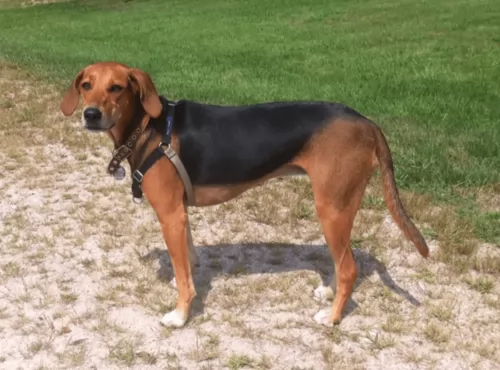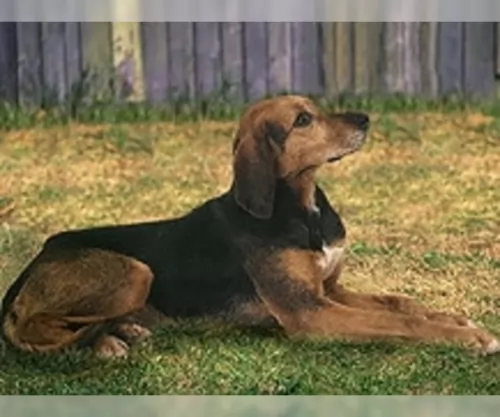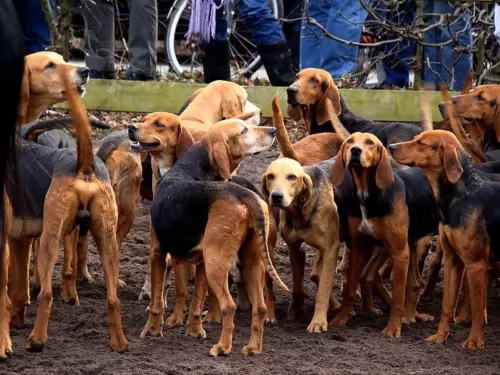 Petzlover
PetzloverKerry Beagle is originated from Ireland but Kuri is originated from French Polynesia. Kerry Beagle may grow 15 cm / 6 inches higher than Kuri. Kerry Beagle may weigh 12 kg / 27 pounds more than Kuri. Both Kerry Beagle and Kuri has same life span. Both Kerry Beagle and Kuri has almost same litter size. Both Kerry Beagle and Kuri requires Low Maintenance.
 The Kerry Beagle is an ancient dog breed, thought to go back as far as the 16th century and looked upon as one of the oldest of all the Irish dog breeds. The dog was introduced to Ireland by the Celts.
The Kerry Beagle is an ancient dog breed, thought to go back as far as the 16th century and looked upon as one of the oldest of all the Irish dog breeds. The dog was introduced to Ireland by the Celts.
It is believed to have descended from the Old Southern Hound or Celtic Hounds.The Kerry Beagle was taken by Irish immigrants to America and is a foundation breed in the development of the Coonhound for hunting and scenting.
The Kerry Beagle isn't recognized by the AKC but has been recognized by the Irish Kennel Club in 1991. It is still rare outside of Ireland and it hasn't been recognized by major kennel clubs.
Kurī, also known as Guri or Peroor New Zealand Native Dog, is the Maori name for this dog which was introduced to New Zealand by the Maoris when they migrated from East Polynesia around 1280 AD.
They were in fact Polynesian dogs which died out in New Zealand. The Māoris would use the dog as a food source and the skins would be used to make some form of clothing. The bones were used to make items such as necklaces and fish hooks.
Not surprising then that the dog became extinct in New Zealand, with the last known Kuri specimens being found in the Museum of New Zealand Te Papa Tongarewa.
 The Kerry Beagle is a medium sized dog with a solid physique. He stands at about 56 – 61cm and weighs between 22 and 27kg. He has a broad head with drop ears. His eyes are large and deep set and are a yellow to brownish color, giving the dog an intelligent expression.
The Kerry Beagle is a medium sized dog with a solid physique. He stands at about 56 – 61cm and weighs between 22 and 27kg. He has a broad head with drop ears. His eyes are large and deep set and are a yellow to brownish color, giving the dog an intelligent expression.
His coat is short and the most common color for this dog is black and tan, but you can also find tan and white or some blue mottling as well. He is a lean, muscled dog with a deep chest and legs which are slim and long, providing the dog with the ability to pick up speed on a hunt. The tail of the dog is long and slightly curved and carried level.
As a packhound this dog is a serious hunter. He may look aggressive as he goes after his prey but he is actually a calm, well-balanced, friendly dog who forms a strong, loving relationship with his human family.
He is also gentle and playful with children in the home and also gets on well with other dogs too. He is intelligent and will readily respond to training and socialization. It's a dog that just loves being outside, especially when there is something to do, such as playing ball games or going on a long walk.
He is alert and inquisitive and makes an excellent watchdog. A home with a good sized garden will be ideal for the Kerry Beagle, though it can be kept in small gardens in the city too, just so long as he is given the opportunity for daily exercise.
The Kuri is extinct now but it was a small to medium sized dog with a thick set neck. He stood between 25 and 46cm and weighed about 13 to 15 kilograms.
He had thick medium-length rough textured hair, small head, erect ears, short legs and a bushy tail. The color of their weatherproof coats varied and some were black, some white or cream and some were a mix of colors and patterns.
An interesting feature about them is that they didn’t bark but instead they howled. They were good at hunting birds.
The Kuri wasn’t considered the brightest breed, but he would have benefited from some training and socialization as this just makes a dog a better pet in every sense – more obedient and better behaved in all situations.
Some Kuris were friendly and able to bond with their human owners, while others were independent and somewhat aloof. Their size would have allowed them to be kept in the city or the country as they weren’t particularly energetic dogs, not requiring much ground to run around in.
 The Kerry Beagle may well be quite an aggressive dog when showing off his hunting skills, but when it comes to being around his human family, he softens up and becomes a gentle, loving friend.
The Kerry Beagle may well be quite an aggressive dog when showing off his hunting skills, but when it comes to being around his human family, he softens up and becomes a gentle, loving friend.
He is an affectionate playmate for children and also gets on well with other dogs you may have in the home.
Your Kerry Beagle is alert, intelligent and active, and when you have one of them as a 4-legged family member, you'll discover what a wonderful, devoted companion he can be.
It appears as though some Kuris were kept as pets and that they were able to develop loving relationships with their owners.
We don’t know too much about the extinct Kuri, but scientists are now studying and analyzing the hairs of the dog to find out more about it, and specifically why the Maori dog disappeared some time in the 19th century without a trace.
They will also be analyzing Kuri bones salvaged by archaeologists and which were found on rubbish heaps. These bones can be tested to see whether the diet of the Kuri changed much between the days of Maori settlements and the arrival of the European settlers.
 If your Kerry Beagle is ill or injured you need to get him to the vet for a full assessment. As a puppy he will also need certain vaccinations to protect him from some life-threatening illnesses as well as getting de-wormed.
If your Kerry Beagle is ill or injured you need to get him to the vet for a full assessment. As a puppy he will also need certain vaccinations to protect him from some life-threatening illnesses as well as getting de-wormed.
Bad smelling breath is a symptom that your pet's teeth need checking. If you're not sure how to maintain his teeth, make sure your Kerry Beagle has professional dental cleaning to ensure his gums and teeth are kept in a healthy state. Your vet will give you advise on how to watch for periodontal disease.
In hot weather particularly, check your dog over for fleas and ticks and remove them.
Heartworm is a fatal disease which which can affect your dog. Speak to your vet about treatments as living in a hot, wet area opens you pet up to bites from infected mosquitoes.
Some Kuri dogs scavenged while others were pets and ate well. The lifestyle they led would have determined their health. In those days they would have suffered with dental disease, common in adult dogs. Left untreated, dental disease can lead to dental tartar buildup with gum inflammation and tooth loss.
Dental disease can also lead to other organ diseases. These days brushing your dog’s teeth with canine toothpaste and toothbrush can help to ward off dental disease.
Those Kuris that weren’t pets, tried to survive scavenging, and their homeless situation could well have led to ear infections – caused from a wax- and dirt buildup within the ear. He would have been frantic trying to scratch his ears. In modern times, if your dog showed signs of an ear infection, you would need to get him to the vet.
 Because of the short coat of the Kerry Beagle, he is looked upon as a low maintenance dog. He doesn't shed very much, and simple grooming is required such as brushing the coat twice a week.
Because of the short coat of the Kerry Beagle, he is looked upon as a low maintenance dog. He doesn't shed very much, and simple grooming is required such as brushing the coat twice a week.
His nails will also need to be clipped, as left long, they can hook on things and rip your pet's flesh.
You will need to check his teeth and also check inside his ears. Dogs with floppy ears are more prone to infection in the ears and this can cause terrible pain for your pet.
If you keep your Kerry Beagle as a hunting dog, you will know that active dogs like these have different dietary requirements to companion dogs.
All that activity requires top quality nutrition and a certain amount of calories. If you're buying dry kibble, make sure its the highest quality so that he doesn't require huge portions to satisfy him. Leading canine nutritionists recommend a hunting dog like this be fed a large meal once a day and preferably in the evening, after all the hunting action.
The Kuri will have required regular grooming which means a brushing down twice a week. Brushing would have been useful to prevent loose hairs from shedding with the dog. He would have had to have his ears and eyes checked too to avoid infections. Brushing him would have given his owner the chance to check him over for fleas and ticks too.
As the Kuri wasn’t an overly energetic dog, a walk a day would have kept him content and fit.
The Kuri was a dog that essentially formed part of someone else’s diet. Those that managed to escape being a meal for someone no doubt had to scavenge for food. Because they were used to help people catch birds, they themselves were used to catching birds for themselves.
As a small to medium sized dog, if you were to keep such a dog as a pet you would have given him a cup or two of dried kibble a day and tried to vary his diet by including some home-cooked food and raw meat.